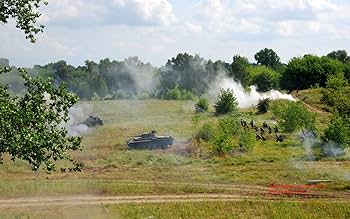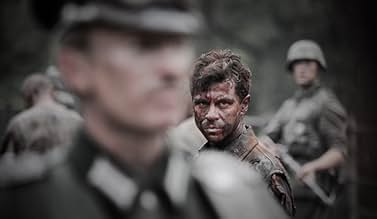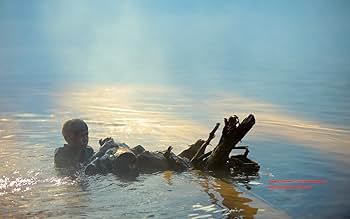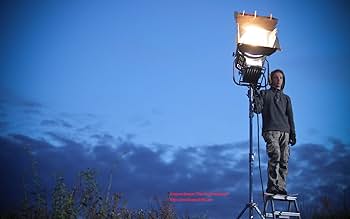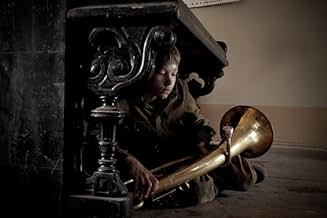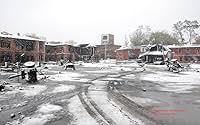NOTE IMDb
7,4/10
11 k
MA NOTE
Un drame de guerre qui se déroule pendant l'invasion de l'Union soviétique par les nazis en juin 1941, au cours de laquelle les troupes soviétiques ont tenu une place forte à la frontière du... Tout lireUn drame de guerre qui se déroule pendant l'invasion de l'Union soviétique par les nazis en juin 1941, au cours de laquelle les troupes soviétiques ont tenu une place forte à la frontière durant neuf jours.Un drame de guerre qui se déroule pendant l'invasion de l'Union soviétique par les nazis en juin 1941, au cours de laquelle les troupes soviétiques ont tenu une place forte à la frontière durant neuf jours.
- Réalisation
- Scénario
- Casting principal
- Récompenses
- 7 victoires et 14 nominations au total
Aleksey Kopashov
- Sashka Akimov
- (as Alyosha Kopashov)
Anna Tsukanova-Kott
- Sonya
- (as Anna Tsukanova)
Avis à la une
War movies based on true events are always something special because you can feel the suffering and the absurdity of war. Most of World War II movies are about well known battles like Normandy, Obama Beach, The Ardennes and so on, but I prefer watching more unknown battles because they have the right to be remembered also. In this movie we get another untold story about the Soviet troops defending the Brest fortress against the German Nazi invasion. We will never know how accurate those battles are. It's a Soviet movie so it might been shot as Soviet propaganda. But the least we can say is that this movie is very well done. Not the usual goodlooking Hollywood stars playing a war hero, but actual day-to-day normal looking people, like you and me, acting in some very captivating scenes. I don't know if those actors are famous in their fatherland but they sure did a hell of a good job. Probably not with a huge budget, they still managed to make it look pretty real. The story about this East front battle is special, sometimes told with a narrating voice of a kid that survived this hell, and will certainly have your attention. After Anthropoid and Kajaki, another great war movie that won't leave you without emotion.
I don't like reading subtitles, but I will for a particularly good movie, and this certainly is one. I also don't normally gravitate toward war movies, but again, I'll make an exception for a good one, and I give this one a 9. It might be even better than that. There is so much for the eye here; I'm very impressed at the amount of work which must have gone into making every shot look so real. Also, the soundtrack was not overwhelming; for the most part, what we see is what carries the emotion, and that is a testament to the power of the events and the quality of the reconstruction of them for this movie.
There's a lot of violence, shooting, dying, etc. here, but not a lot of really nasty gore, which is something I appreciate. I'm sure the reality may have been even uglier than what is shown in this movie, but I don't need to see every last ounce of gore to know that war sucks and people get horribly maimed and killed. What is shown is enough to make the point well.
Very high quality movie; strongly recommended.
There's a lot of violence, shooting, dying, etc. here, but not a lot of really nasty gore, which is something I appreciate. I'm sure the reality may have been even uglier than what is shown in this movie, but I don't need to see every last ounce of gore to know that war sucks and people get horribly maimed and killed. What is shown is enough to make the point well.
Very high quality movie; strongly recommended.
10chip1977
I like this movie considering all the crap films made in my country for last 20 years. From my view it has almost no propaganda (ok, I'm brainwashed already). Narrator probably is telling less that he could, so some plot points are not that clear, but the film keeps you at the screen for all the time.
And final note to some historians here: if you mention history background and occupation of Brest by Soviet Union in 1939, please go further and mention that it was taken by Poland from Russia in 1919, it was behind the Curzon line (the Poland people were not the majority of population) and should have stayed the Russian city.
And final note to some historians here: if you mention history background and occupation of Brest by Soviet Union in 1939, please go further and mention that it was taken by Poland from Russia in 1919, it was behind the Curzon line (the Poland people were not the majority of population) and should have stayed the Russian city.
A convincing and brutal drama about the war's ugly and scary face, which is as much poignant as it is riveting and engrossing from start to finish.
The doomed fortress of the border town of Brest was built a hundred years before the first onset of German deceitful invasion into the Soviet land at early dawn of June 22, 1941. It had been changing hands several times before, notably in 1918 when it was surrendered to the Germans under notorious Brest Peace Treaty. It was released thereafter to the Poles, then liberated by the Red Army, then transferred to Poland again. Under the Polish administration the fortress was first affected by German air raid in 1939 and significantly damaged under the massive onslaught of the German troops.
Before the end of 1939 the city of Brest (and its fortress) was finally incorporated into the Soviet Union. By the commencement of war, the Brest fortress was a home to a number of Soviet military units - infantry battalions, reconnaissance and artillery regiments, miscellaneous attached units and troops, all-in-all up to 8000 servicemen and several hundreds of their families, wives and children were stationed therein.
The film starts unfolding peacefully on the eve of the war - a regular day in the lives of ordinary people in a military compound - orchestra rehearsals, dancing, shopping, kisses, Saturday evening film screening - the late peaceful everyday routine...
Persistent rumors that the Germans were cranking up preparations for a breakthrough on the border were considered as sabotage and eventually suppressed. But anticipation of imminent disaster was intensified by a particularly creepy late night scene of the special vanguard troops disguised in Soviet military uniform disembarking from a train following subdued German language orders.
Heavy artillery fire that all of a sudden pierced silence at the daybreak of June 22 instantly inflicted heavy human and material losses, disrupted communication, cut off power supply and destroyed military munitions. Followed by meticulously coordinated combat assault immediately afterward, it took the inhabitants by surprise and split the garrison into several relatively small and isolated pockets of nevertheless pretty fierce resistance.
Under massive German attacks the city was defeated fairly early, whereas the small number of the besieged Brest fortress survivors with scarce resources, deprived of food, water and medicine, and with narrowing hope for reinforcement or backing from the retreating regular forces, kept on defending the small plot of Soviet land against the invaders for many days.
Though the essence of the story is certainly a portrayal of the valor of Soviet soldiers that lost their lives defending the first citadel and symbol of Russian resistance, the film manages to avoid as much as possible worn-out heroic clichés and propagandistic pathos that were often compulsory elements even in the best examples of Soviet war movies of the past. Yet, unlike many politically engaged modern movies, it resists the temptation to deride the peculiarities of Soviet lifestyle of that time and to speculate on the popular issues of "Stalinist regime's atrocities".
Instead, the film focuses on accurate capturing of a full range of authentic human emotions from joy, love and devotion at the early beginning of the film through angst, fear and pain as it progresses to hopelessness and despair. It tells the frightening story of regular people, which lives were turned upside down overnight when they end up face to face with unstoppable deadly force menacing their families, their loved ones, their own lives and their country.
It pulls no punches when it comes to depiction of enormous destructions and horrors of war with first rate set designs and visually arresting special effects, but the main asset of the film is, of course, excellent nuanced performances from the entire cast especially the leads - Korshunov, Merzlikin and Derevyanko.
The story is told as if from the perspective of a teenage boy witnessing the outbreak of war and providing narration already as a war veteran that has survived the worst war in modern history. It may be emotionally draining cinematic experience for many viewers, but I believe it could be especially conducive for the younger generation to acquire better understanding of the actual tremendous price the nation has paid for the great Victory.
The doomed fortress of the border town of Brest was built a hundred years before the first onset of German deceitful invasion into the Soviet land at early dawn of June 22, 1941. It had been changing hands several times before, notably in 1918 when it was surrendered to the Germans under notorious Brest Peace Treaty. It was released thereafter to the Poles, then liberated by the Red Army, then transferred to Poland again. Under the Polish administration the fortress was first affected by German air raid in 1939 and significantly damaged under the massive onslaught of the German troops.
Before the end of 1939 the city of Brest (and its fortress) was finally incorporated into the Soviet Union. By the commencement of war, the Brest fortress was a home to a number of Soviet military units - infantry battalions, reconnaissance and artillery regiments, miscellaneous attached units and troops, all-in-all up to 8000 servicemen and several hundreds of their families, wives and children were stationed therein.
The film starts unfolding peacefully on the eve of the war - a regular day in the lives of ordinary people in a military compound - orchestra rehearsals, dancing, shopping, kisses, Saturday evening film screening - the late peaceful everyday routine...
Persistent rumors that the Germans were cranking up preparations for a breakthrough on the border were considered as sabotage and eventually suppressed. But anticipation of imminent disaster was intensified by a particularly creepy late night scene of the special vanguard troops disguised in Soviet military uniform disembarking from a train following subdued German language orders.
Heavy artillery fire that all of a sudden pierced silence at the daybreak of June 22 instantly inflicted heavy human and material losses, disrupted communication, cut off power supply and destroyed military munitions. Followed by meticulously coordinated combat assault immediately afterward, it took the inhabitants by surprise and split the garrison into several relatively small and isolated pockets of nevertheless pretty fierce resistance.
Under massive German attacks the city was defeated fairly early, whereas the small number of the besieged Brest fortress survivors with scarce resources, deprived of food, water and medicine, and with narrowing hope for reinforcement or backing from the retreating regular forces, kept on defending the small plot of Soviet land against the invaders for many days.
Though the essence of the story is certainly a portrayal of the valor of Soviet soldiers that lost their lives defending the first citadel and symbol of Russian resistance, the film manages to avoid as much as possible worn-out heroic clichés and propagandistic pathos that were often compulsory elements even in the best examples of Soviet war movies of the past. Yet, unlike many politically engaged modern movies, it resists the temptation to deride the peculiarities of Soviet lifestyle of that time and to speculate on the popular issues of "Stalinist regime's atrocities".
Instead, the film focuses on accurate capturing of a full range of authentic human emotions from joy, love and devotion at the early beginning of the film through angst, fear and pain as it progresses to hopelessness and despair. It tells the frightening story of regular people, which lives were turned upside down overnight when they end up face to face with unstoppable deadly force menacing their families, their loved ones, their own lives and their country.
It pulls no punches when it comes to depiction of enormous destructions and horrors of war with first rate set designs and visually arresting special effects, but the main asset of the film is, of course, excellent nuanced performances from the entire cast especially the leads - Korshunov, Merzlikin and Derevyanko.
The story is told as if from the perspective of a teenage boy witnessing the outbreak of war and providing narration already as a war veteran that has survived the worst war in modern history. It may be emotionally draining cinematic experience for many viewers, but I believe it could be especially conducive for the younger generation to acquire better understanding of the actual tremendous price the nation has paid for the great Victory.
This is definitely the best war movie shot in the ex-USSR in post-Soviet time. This is what that war was for our country and our people. The level of fiction and fantasy is minimal; the movie is shot as close to historical truth as possible. The Brest Fortress Museum supervised the plot thoroughly. The Brest Fortress became the place where the German invaders lost 5% of their East Front deadcount within the first week of war. Come have a look on how our granddads fought against the Nazis. There are no starship troopers in the movie; just real Red Army soldiers and a deadly mouse gray mass of German invaders that killed 20+ millions of our compatriots and brought to our country countless loss.
Le saviez-vous
- GaffesAround time code 1h20, we see Stukas bombing the fortress. The firsts Stukas pass arrive correctly. The other Stukas have their head down and arrive on the back. Technicians have probably inverted the images.
- ConnexionsFeatures Les joyeux garçons (1934)
Meilleurs choix
Connectez-vous pour évaluer et suivre la liste de favoris afin de recevoir des recommandations personnalisées
- How long is Fortress of War?Alimenté par Alexa
Détails
- Date de sortie
- Pays d’origine
- Site officiel
- Langues
- Aussi connu sous le nom de
- La Bataille De Brest-Litovsk
- Lieux de tournage
- Sociétés de production
- Voir plus de crédits d'entreprise sur IMDbPro
Box-office
- Montant brut mondial
- 4 569 604 $US
- Durée2 heures 18 minutes
- Couleur
- Mixage
- Rapport de forme
- 2.35 : 1
Contribuer à cette page
Suggérer une modification ou ajouter du contenu manquant



